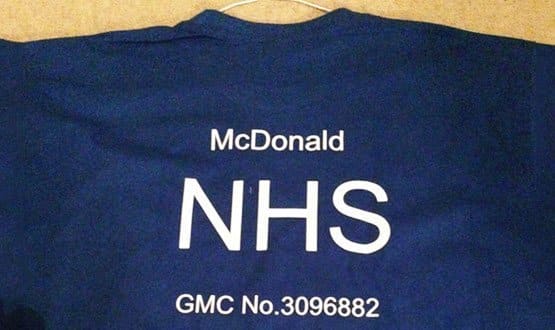Joe’s view of feedback
- 4 June 2013

My 81-year-old mother rang me at the weekend. She’d had new windows fitted and her living room carpet was now two inches too long along the full length of the window.
The “window men” weren’t prepared to trim the carpet because it was “the very best –John Lewis.”
My mother obviously knows how good I am at DIY and therefore wanted my help with engaging the services of a carpet fitter; she’s rather deaf and struggles on the phone.
When I Googled “carpet fitter Newcastle” I found my self on the www.ratedpeople.com website.
Ten minutes later I was talking to Sean, the carpet fitter who 36 hours later had solved the wayward carpet edge, quickly, courteously and at a reasonable price.
He was at pains to phone me afterwards and ask me to rate him on the website; which I duly did. Good for him, good for other people seeking carpet fitters.
A decade of NHS regulation
Well, bearing Sean the carpet fitter in mind, I’d like to talk about Francis 2, the report into goings on at Mid Staffordshire NHS Foundation Trust.
It’s a shocking read, both in terms of the horrific failure of care that it chronicles and in the way it’s written.
It’s an overly long and wordy document with far too many recommendations. It sets out 190 recommendations, which threaten to spawn yet another dataset and box ticking exercise.
The most disappointing aspect of Francis 2, though, is its failure to point the finger at the failure of the regulatory system.
I have been an advocate for the measurement of quality in mental health services for over 20 years.
I published my first research in to the use of computers in the field in 1994 (Wilkinson, I, McDonald, J W, Searson, S (1994). Setting and Evaluating Standards for Family Services. ACPP Review and Newsletter 16 (2) 70-76).
I was appointed as an associate of the Commission for Health Improvement in 2000 and did inspection work under the regime established by its then-head, Peter Homa, whereby teams of experts were carefully selected and carried out rigorous peer review of mental health trusts.
It felt like a useful process to me (I learned a lot of good practice and also was able to point out bad practice).
Anything to be included in a CHI final report had to be “triangulated” – corroborated by three separate pieces of evidence – going some way to making sure that reports had some basis in fact.
Unfortunately, because the political system has become more and more enamoured of micromanaging the performance of trusts, the system of regulation has got ever more prescriptive.
CHI’s peer review process morphed into the Care Quality Commission’s demand for huge forms to be filled out.
In this regime, the prize for identifying a problem is the opportunity to fill in even more forms producing even more data. This makes it very tempting to rate yourself as somewhat better than you actually are.
Targets – it’s not always a good idea to hit them
Rather than a bottom up peer review process – like surgeons comparing complication rates with their peers – we have increasingly gone for a top down, bureaucratic system of regulation.
This has left managers in charge of quality and safety issues, while the caring professions have been increasingly burdened with the collection of data which means nothing to them and is never fed back to them in any meaningful way.
William Edwards Demming, the Godfather of quality, said: “If you incentivise people to hit a target you can be sure they will hit it, even if it causes the failure of the overall enterprise.”
Mid Staffs hit all the targets it was asked to hit except the one that really mattered; humane patient care.
Time to learn from Sean the carpet fitter
Much has been said recently about ‘big data’ and how it might drive up the quality of the NHS. While I am obviously an enthusiast for more and better electronic patient record systems, let’s not kid ourselves about this.
EPRs are not currently good enough to drive up quality because we have failed to crack the basic problem of getting all the data entered.
The imposition of massive datasets to be entered by overstretched NHS clinicians on systems with usability that is, at best, “poor to moderate” threatens the quality of care more than it helps it, particularly at a time when we are trying to pull £20 billion out of the overall NHS budget.
So we’re doomed.
What can we do? Well, if the kit isn’t good enough to allow the gathering of a big enough dataset without taking up too much clinical time, then at this point in time we need to gather the least amount of data that will have the greatest effect on quality and safety for the least expenditure.
We also need to make clinicians once again the guardians of safety and quality within healthcare organisations.
This means, us, the clinicians collecting feedback from patients on the quality of user experience we have provided as individuals and being serious about getting serious amounts of feedback.
This means making it really obvious who we are and really easy to provide feedback. This was demonstrated by a recent project in my own clinic by my former colleague, the brilliant Dr Zoe Gilder.
She initiated a scheme whereby each child at clinic was given a counter by the doctor. On leaving, the child could place the counter in a happy box, middling box, or sad box depending on their experience with the doctor.
This achieved feedback rates of over 97%. A response rate unheard of with other feedback systems.
Each doctor had different coloured counters and at the end of the month the boxes were opened and the results were analysed to see which doctors got the best feedback.
Were the doctors interested in the results? Is Sean the carpet fitter interested in his rating on RatedPeople.com? Computerise THAT IwantGreatCare, Patient Opinion, and NHS Choices!


Joe McDonald
Joe McDonald is a practising NHS consultant psychiatrist. Over the past five years he has been an NHS trust medical director and national clinical lead for IT at NHS Connecting for Health – a stint that included 18 months as medical director of the Lorenzo delivery team!
His experiences in the National Programme for IT in the NHS have left him with a passion for usability and "end user knowledge networks.” He is the founding chairman of the National Mental Health Informatics Network. Motto: we don’t get fooled again. Follow him on twitter @CompareSoftware




